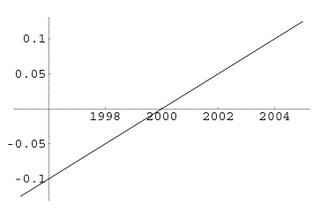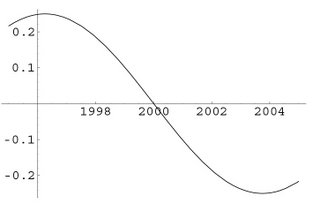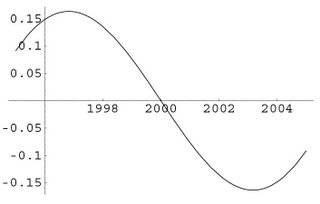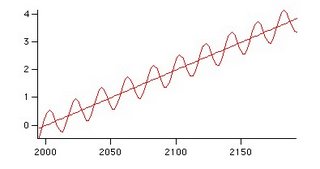(thanks to a tip from a reader)
I'm really going to miss Sherwood Boehlert, who's retiring at the end of the term. Here's why:
FOR IMMEDIATE RELEASE
September 20, 2006
Science Committee Press Office: 202-225-4275
Joe Pouliot, joe.pouliot@mail.house.gov
Zachary Kurz, zachary.kurz@mail.house.gov
BOEHLERT DISCUSSES CLIMATE ISSUES
WASHINGTON - House Science Committee Chairman Sherwood Boehlert (R-NY) today delivered the following speech at the Climate Institute's Washington Summit on Climate Stabilization:
I know that yesterday you heard from some of the world's leading scientists about the frightening possibility that the earth's climate may change more quickly and abruptly than expected, and whether there's anything that can be done to avoid that.
Well, this morning's session should offer a break from all of that. Instead, I'm going to talk about the frightening possibility that Washington's political climate may not change more quickly and abruptly than expected, and whether there's anything that can be done to avoid that.
Certainly, without abrupt political climate change, it's going to be next to impossible to do anything about global climate change.
Let me hasten to add that by calling for "political climate change," I'm not covertly advocating a change in political party control. There are segments of both parties that support action to address climate change, and segments in both parties that don't.
But right now, those of us who seek action are confronted by ideology, by fear, by a reluctance to lead, by apathy, by comfort with the status quo. All of that has to change, and I think it is beginning to change.
But before I get to some of the better news, let me give you one illustration of how hard it is to make progress right now. One of the simplest steps we could take to reduce greenhouse gas emissions would be to increase the mileage of our auto and light truck fleet.
It just so happens that increasing mileage would also enhance our national security, bolster our economy, and save consumers money.
And, according to the National Academy of Sciences, we could increase mileage substantially, using technology that already exists, without any reduction in safety. So to exaggerate only a little, this should be a no-brainer - even without taking climate into account, but especially when climate concerns are added to the mix.
So has Congress voted to increase mileage requirements, known as Corporate Average Fuel Economy, or CAFE standards? No.
The proposal has been defeated repeatedly in both the House and the Senate by a mixture of conservative ideologues, and Republicans and Democrats who are lobbied by automakers and/or the United Auto Workers. And I should know because I'm the guy who offers the amendment in the House each time.
Now in the House at least, we do a little better each time. We got 160 votes in favor in 2001, 162 in 2003, and 177 in 2005, and we know we would do better still this year because Members have declared publicly that they've changed their position.
Unfortunately, we can't seem to get a vote scheduled this year, despite high gasoline prices, perhaps because we're on the cusp of victory, at least in the House.
But my point is a more sober one: if we can't make a relatively simple change in mileage regulations - a change to an existing regulation that doesn't even require new technology and that would have numerous benefits aside from the climate implications, then what does that say about our ability to reduce greenhouse gas emissions? It certainly doesn't say anything good.
So all of us who want to see some action on climate change have our work cut out for us.
In the House, many, perhaps even most Members, still question whether climate change is a genuine phenomenon. The scientific consensus has simply not pierced through the ideological barriers. And there are briefings almost weekly sponsored by groups that argue that climate change science is some kind of environmental conspiracy, and they bring seemingly credentialed people forward to make their claims.
We've even had to confront the situation where Members of Congress have tried to investigate scientists whose views made them uncomfortable.
In July 2005, the Energy and Commerce Committee initiated an investigation of Michael Mann and his colleagues who wrote the so-called "hockey stick" article. I took that Committee to task, arguing that raising questions about scientific methods and conclusions was fine, but intimidating scientists was not.
As I wrote to that Committee, "The only conceivable explanation for the investigation is to attempt to intimidate a prominent scientist and to have Congress put its thumbs on the scales of a scientific debate. This is at best foolhardy; when it comes to scientific debates, Congress is 'all thumbs.'"
Eventually, I asked the National Academy of Sciences to convene a panel to look at the historic temperature record. That panel came up with what I think just about everyone views as a balanced and thoughtful report.
It took issue with some of Dr. Mann's initial methods and specific conclusions, but it confirmed that the past few decades have been hotter than any time in at least the last 400 years and probably longer.
This July, the Energy and Commerce Committee had a hearing on that report, which was a legitimate Congressional step to take.
We'll have to wait and see how the testimony at that hearing will influence the future thinking of the Members of that Committee.
I should say that the White House position has been far more nuanced than that of most House Members. The President has stayed within the bounds laid out in the 2001 National Academy of Sciences report on climate change that he requested.
The emphasis of the White House view changes a little depending on who is speaking, but the White House has not been in the camp of those who deny climate change, although it has shied away from mandatory action to combat climate change - unfortunately, in my view.
Now, we're seeing rumors in the media that the White House may be planning a major climate announcement in the next few weeks. I have no idea if that is true.
I'm more concerned about how the Administration is implementing its existing climate plans and programs. Our Science Committee's Energy Subcommittee has a hearing later today, for example, on the Administration's strategic plan for the Climate Change Technology Program, or CCTP.
I have the highest regard for Energy Secretary Bodman, an alumnus of Cornell and MIT, who is a true advocate for science and a candid and creative thinker. But I am not a big fan of the strategic plan, which is more of an inventory of existing programs and a wish list of possible future ones, than a planning document with clear priorities.
Moreover, as is often the case with this Administration, the plan is silent on what policies might be necessary to actually get new or improved technologies into the marketplace.
"If someone builds it, they will come" is not much of a technology deployment strategy, especially when the immediate and significant benefits of new technologies may accrue more to the public as a whole than to the individual consumer.
The example of hydrogen illustrates my point. Hydrogen has a long, long way to go to be a useful energy source, but its potential is enormous and worth pursuing. But we're not going to be driven to a hydrogen economy simply through market forces.
Every transportation revolution in American history - canals, railroads, turnpikes, air travel, interstate highways - has been underwritten by the government.
It's folly to think that that wouldn't be true of a hydrogen revolution, especially since a hydrogen "revolution" would require displacing our current infrastructure, an infrastructure that works just fine from an individual perspective.
But the good news is that the Administration understands that we need new technologies to address climate change, and that the government has a role in developing them.
The third federal player is the Senate, and Senator Bingaman can focus on them. But the Senate, thought it pains me to say it, has been the leader on climate change policy, albeit with minimal results.
Legislation that is explicitly designed to address climate change has at least come up for a vote in the Senate - something that is almost inconceivable in the House. And bills like the McCain-Lieberman cap-and-trade proposal have done respectably, although they have not been passed.
One of the most hopeful events in Washington related to climate change all year was the all-day session that Senator Domenici and Senator Bingaman held back in April to have serious discussions about how greenhouse gas emissions might be regulated.
At that session, not only the senators, but also key business leaders, expressed openness to finding ways to control emissions.
And an even more hopeful sign is what's been happening in the states. California and the northeastern states are trying to take concrete action to reduce greenhouse gas emissions. And many other states and localities have expressed interest in reducing their emissions.
Given the way states compete for jobs and the fact that the impacts of greenhouse gases are felt internationally, not locally, this state interest is not what one would expect. But it's a sign that the public is beginning to sense that this is a problem that must be addressed.
And, of course, the key to creating abrupt political change will be to further engage, educate and inspire the public. Politicians are responsive to public opinion, even in this day and age of political manipulation and multinational corporations.
In fact, in this era of the Internet and constant polling, politicians may be, if anything, too responsive to momentary shifts in public opinion.
So what's needed is for scientists and politicians and concerned business leaders to redouble our efforts to reach out to the public through as many different forums as possible. Complacent satisfaction with our own right beliefs won't carry the day.
The abolitionist Wendell Phillips famously said, "One man on the side of God is a majority." But while that no doubt got Phillips through some lonely times, the anti-slavery advocates didn't gain political influence until they won more converts.
So scientists have to engage. And what scientists say needs to be clear and accurate and modulated and persuasive. Hyperbolic claims will only diminish scientific credibility over time.
Scientists have to be clear about what we know, and about what we don't. They need to be "up front" about uncertainties - and about the potential costs of waiting until all uncertainties are resolved.
(I always quote former Governor Tom Kean's line about acid rain. He said that if all we do is continue to study acid rain, "we'll have the best documented environmental disaster in history.")
We need to lay out an argument for action, but we won't win by mimicking the opposition's tendencies toward rhetorical excess.
And we need to keep in mind that if we win - if the political environment changes so that a desire for action takes root - then our hardest tasks will be ahead of us.
We may end up longing for the days of debate over whether climate change is real - because the intellectual and political decisions we will have to make to confront climate change - whether through mitigation or adaptation or, more likely, both - are going to make today's debates seem like child's play.
I don't think there's anything about the European experience post-Kyoto, for example, that should make us think that this is going to be easy.
So, like abrupt climate change, abrupt political change will present us with a different and problematic world with new and uncomfortable choices. But unlike abrupt climate change, a changed Washington should give us reason for hope, despite all its attendant difficulties.
Climate change discussions can be consumed by gloom. They can remind me of the opening of Woody Allen's classic essay, "My Address to the Graduates." It starts: "Today, we are at a crossroad. One road leads to hopelessness and despair; the other to total extinction. Let us pray we choose wisely."
I think our choices are a little better than that, and if they're not, we'll never win over the wider public.
We have had successes in the recent past in winning over skeptics and taking action. We have controlled the CFCs that created the ozone hole. The Bush Administration has imposed strict new regulations to control fine particles - the health effects of which were still the subject of angry debate not so long ago.
These problems were easier to tackle than climate change, but they didn't seem very easy at the time. The public and policy makers had to be convinced of the science so that difficult concrete steps could be taken.
So I look forward to working with all of you, to continuing to learn with all of you, so that we can create a political climate in which action is possible on climate change.
That's going to take a lot of tough and honest discussion. But it can be done. If we break through the current apathy and cynicism, we can revive American politics, and our environment will be the beneficiary.
Thank you.



